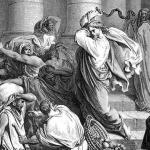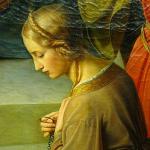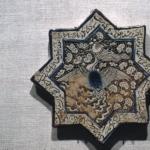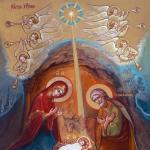Parable of the Ten Virgins. Interpretation of the parable of the ten virgins Bible new testament parable of the 10 virgins
Answered by Alexandra Lanz, 12/16/2012
Question: "In the book of Matthew, chapter 25, Jesus tells the parable of the 10 virgins. What is meant by oil in the lamps? What is oil for us today?"
Peace be with you, Arsen!
In order not to be mistaken in interpreting the symbolic meaning of "butter", let's consider it against the background of two other words that are directly related to it:
LAMP
THEIR VESSELS
OIL
Knowing that Jesus told this parable to the Jews who grew up with words and symbols Torah and Prophets, we must look for interpretation there.
What do we see regarding " lamp "?
...there is a commandment lamp, and instruction - light, and edifying teachings are the way to life...Your word - lamp my foot and light my path.
Light the righteous burn merrily, lamp but the wicked are quenched.
Whoever curses his father and his mother lamp will go out in the midst of deep darkness.
You're on fire lamp my, Lord; My God enlightens my darkness.
The lamp can be interpreted as 1) the Word of God and 2) the life of a person lasting through time.
Now let's see what can be meant by the words " their vessels". The word “vessel” is used in the Torah and the Prophets in several meanings. To understand the meaning of the parable, the most appropriate of them is when by “vessel” we mean “the person himself.”
I am forgotten in hearts, as if dead; I am like vessel broken...“Is this man, Jehoiachin, a despicable, rejected creature? Or is he - vessel obscene? Why were they thrown out - he and his tribe, and thrown into a country they did not know?
Woe to him who disputes with his Creator, shard from earthly shards! Will he tell clay to the potter: "What are you doing?" and your business [will it say about you]: “He has no hands?”
The sons of Zion are precious, equal to the purest gold, as they compared to pottery, handicraft potter!But now, Lord, You are our Father; We - clay, and You are our educator, and we are all the work of Your hand.
Now we can try to determine what the symbol is " oil ".
Firstly, it supports combustion" lamp ", which is the Word of God = the life of a person, and, secondly, it can be inside a person, and must be there so that a person can be saved.
In the Bible, the word “oil” also has a synonym - the word “oil”. It was made from olives. Let's see where and how both these words occur. We will see that oil (oil) is always found in the same environment:
OIL, GRAPE WINE, BREAD
And all the Jews began to bring tithes of bread, guilt And oils to the storerooms.Joel 1:10 The field is desolate, the earth mourns; for it is destroyed bread, grape dried up juice, withered olive.
and the earth will hear bread And wine And oils; and these shall hear Jezreel.
Joel 2:19 ...behold, I will send you bread And wine And oils and you will be satisfied with them...
All the best of oil and all the best from grapes And of bread their firstfruits, which they give to the Lord...
Let's remember the words of the Apostle Paul:“For I received from the Lord [Himself] what I also delivered to you, that the Lord Jesus on the night in which he was betrayed took bread and having given thanks, he broke it and said: Take, eat, this there is My Body, broken for you; do this in remembrance of Me. Also cup after supper, and said: This cup is new covenant in my blood; Do this whenever you drink, in remembrance of Me. Because whenever you eat this bread and drink this cup, you proclaim the death of the Lord until He comes" ().
The bread and blood of Christ are the proclamation of death for sin and life for righteousness.What then - " oil "?
We turn again to the Torah and the Prophets and in the prophet Zechariah we find a clear explanation of the symbolic meaning of the oil poured into the lamp.
And that Angel returned... And he said to me: what do you see? And I answered: I see, behold, a lamp all made of gold, and a cup for oil on top of it, and seven lamps on it, and seven tubes for the lamps that are on top of it; And two olives on it, one on the right side of the cup, the other on the left side of it. And I answered and said to the angel who spoke to me: What is this, my lord? And the Angel who spoke to me answered and said to me: Do you not know what this is? And I said: I don’t know, my lord. Then he answered and said to me thus: This is the word of the Lord to Zerubbabel, expressing: not by might, nor by force, but by My Spirit , says the Lord of hosts.
The lamp is the Word of God. Oil (oil) is the Holy Spirit of God.This interpretation fully fits into the words of the apostles, such as...
However, anointing which you received from Him, abides in you, and you do not need anyone to teach you; but just as this very anointing teaches you everything, and it is true and not false, whatever it has taught you, abide in it.Who confirms you and me in Christ and who anointed us[is] God, who sealed us and gave the pledge of the Spirit into our hearts.
and having believed in Him, sealed with the promised Holy Spirit Who is the earnest of our inheritance, for the redemption of [His] inheritance, to the praise of His glory.
Here are the words of Jesus Himself:The Comforter Holy Spirit whom the Father will send in My name, will teach you everything and remind you of everything that I told you.To summarize, we see the following picture:
Lamp - the Word of God and human life.
Your vessel is the person himself
Oil is the Holy Spirit of God.Sincerely,
Sasha
Read more on the topic “Interpretation of Scripture”:
Biblical Wisdom
The letter kills, but the spirit gives life.
Wise virgins and foolish virgins
biblical parable
The Kingdom of Heaven will be like the ten virgins, who took their lamps and went out to meet the bridegroom. Of these, five were wise and five were foolish. The foolish ones took their lamps and took no oil with them. The wise, together with their lamps, took oil in their vessels. And as the groom slowed down, everyone dozed off and fell asleep.
But at midnight a cry was heard:
Here, the groom is coming, go out to meet him.
Then all the virgins stood up and trimmed their lamps. The foolish said to the wise:
Give us your oil, because our lamps are going out.
And the wise answered:
So that there is no shortage for both you and us, you better go to those who sell and buy for yourself.
And when they went to buy, the bridegroom came, and they that were ready went in with him to the wedding, and the door was shut. Then the other virgins came and said:
God! God! open to us.
He answered them:
Truly I say to you, I do not know you.
Watch therefore, for you know neither the day nor the hour in which the Son of Man will come.
You may also like these parables:
Fig tree
They told Him about the Galileans, whose blood Pilate mixed with their sacrifices. Jesus said to them:...Matthew 25:1-13:
“Then the kingdom of heaven will be like ten virgins, who took their lamps and went out to meet the bridegroom. Of these, five were wise and five were foolish. The foolish ones took their lamps and took no oil with them. The wise, together with their lamps, took oil in their vessels. And as the groom slowed down, everyone dozed off and fell asleep. But at midnight a cry was heard: “here, the groom is coming, go out to meet him.” Then all the virgins stood up and trimmed their lamps. The foolish said to the wise, “Give us your oil, for our lamps are going out.” And the wise answered: “So that there is no shortage for both us and you, you better go to those who sell and buy for yourself.” When they went to buy, the groom came, and those who were ready went in with him to the wedding feast, and the door was shut; then other virgins come and say: “Lord! God! Open to us." He answered and said to them, “Truly I say to you, I do not know you.” Watch therefore, for you know neither the day nor the hour when the Son of Man will come.”Barnes's commentary defines the lamps referred to in the parable:
“The “lamps” mentioned that were used during marriage ceremonies were most likely torches. They were made from rags twisted around iron or clay utensils, which were filled with oil and was attached to a wooden handle. These torches to give light periodically dipped in oil" (Emphasis added.)
Thus, all ten virgins had oil in their lamps. This is clear from the biblical text, which says that ten virgins, waiting for the groom, came out to meet him. However, the five foolish virgins did not take any supply of oil with them. Perhaps they were expecting the Lord to appear immediately, therefore, they thought that the extra oil would not be useful to them, or they simply did not care about it. Five wise virgins, on the contrary, realizing that they did not know “neither the day nor the hour” on which the Lord would appear, decided to stock up on oil in case their lamps went out. Therefore, they made the necessary preparations. The Lord came at midnight, when no one expected Him. The lamps of the foolish virgins went out, and they had no supply of oil. They were unprepared at the time of the Lord's coming and were unable to attend the wedding feast. The doors were locked when the foolish virgins approached them, and the Lord, instead of opening the doors for them, said: “Truly I say to you, I do not know you.” Jesus Christ told this parable to warn us, as can be seen from the last verse of this parable:
« So stay awake because you don’t know the day or the hour.”
Jesus was not speaking to a general audience or some Pharisees, but to His apostles and disciples (see Matt. 24:4). In other words, the Lord, addressing us, His disciples, says: “Be vigilant, seeing what happened to the foolish virgins!” If this did not apply to us, or it did not matter whether we kept our faith while on the vine or not, then the Lord would have no reason to say to us, “Watch therefore!” This parable would be useless. However, two days before His crucifixion, the Lord addressed not a wide audience of people, but His disciples, warning them. It is dangerous to be found "without oil" or not abiding in It. This will inevitably have serious consequences. People who find themselves “without oil” will not hear the welcoming voice of the Lord; on the contrary, they will be told the same words as the five foolish virgins: “Truly I say to you, I do not know you.”
About the Ten Virgins - one of the parables of Jesus Christ, given in the Gospel of Matthew
“Then the Kingdom of Heaven will be like ten virgins, who took their lamps and went out to meet the bridegroom. Of them, five were wise and five were foolish. The foolish, taking their lamps, did not take oil with them. The wise, along with their lamps, took oil in their vessels. And as the bridegroom slowed down, they all dozed off and fell asleep.
Friedrich Wilhelm Schadow
But at midnight a cry was heard: behold, the groom is coming, go out to meet him. Then all the virgins stood up and trimmed their lamps. But the foolish said to the wise, Give us your oil, for our lamps are going out. And the wise answered: so that there is no shortage for both us and you, you better go to those who sell and buy for yourself. And when they went to buy, the bridegroom came, and they that were ready went in with him to the wedding, and the door was shut; Afterwards the other virgins came and said: Lord! God! open to us. He answered and said to them, “Truly I say to you, I do not know you.” Watch therefore, for you know neither the day nor the hour in which the Son of Man will come."
(Matt.25:1-13)Christ depicted His second coming here using the image, well known to Jews, of the groom coming to the bride’s house during the wedding ritual. According to ancient Eastern custom, after the agreement, the groom, accompanied by family and friends, goes to the house of the bride, who is waiting for him in her best outfit, surrounded by her friends. The wedding celebration usually took place at night, so the bride's friends met the groom with burning lamps and, since the time of the groom's arrival was not exactly known, those waiting stocked up on oil in case it burned out in the lamps. The bride, with her face covered with a thick veil, the groom and all the participants in the celebration went to the groom’s house with singing and music. The doors were closed, the marriage contract was signed, “blessings” were said in honor of the bride and groom, the bride revealed her face and the wedding feast began, lasting seven days if a girl was getting married, or three days if a widow was getting married.
Friedrich Wilhelm Schadow
The wedding feast symbolizes in this parable the Kingdom of Heaven, where believers will be united with the Lord in blissful eternal life. Waiting for the groom means a person’s entire earthly life, the purpose of which is to prepare oneself for a meeting with the Lord. The closed doors of the bridal chamber, which did not allow those who were late to approach the groom, mean human death, after which there is no longer repentance and correction.
The Wise Virgins (Les vierges sages) James Tissot
According to the explanation of St. John Chrysostom, Christ led believers entering the Kingdom of Heaven under the image of virgins, thereby exalting virginity - not only bodily chastity, but, mainly, spiritual, true confession of the Christian Faith and life according to Faith, as opposed to heresy, atheism and negligence in regarding the salvation of your soul. “The lamp,” says St. John Chrysostom, “Christ here calls the gift of virginity, the purity of holiness, and the oil is philanthropy, mercy, helping the poor.” Oil in the Holy Scriptures usually serves as an image of the Holy Spirit, and in this parable the burning oil means the spiritual burning of believers, blessed by the Holy Spirit of God, imparting to them His rich gifts: faith, love, mercy and others, expressed in the Christian life of believers, in particular, in love and helping others. The great righteous Saint Seraphim of Sarov clearly and convincingly explains the parable of the ten virgins. The main idea of St. Seraphim is to understand the purpose of Christian life as “acquiring the grace of the All-Holy Spirit,” which he expressed in a wonderful conversation with the merchant N. Motovilov.
Jacopo Tintoretto
“In the parable of the wise and holy fools,” says St. Seraphim to his interlocutor, “when the holy fools did not have enough oil, it is said: “Go and buy in the marketplace.” But when they bought, the doors to the bridal chamber were already closed, and they could not enter into it. Some say that the lack of oil among holy virgins signifies a lack of lifelong good deeds. This understanding is not entirely correct. What kind of lack of good deeds do they have when, even though they are holy fools, they are still called virgins? After all, virginity is the highest virtue, as a state equal to the angels and could serve as a substitute, in itself, for all other virtues...
I, poor Seraphim, think that they lacked precisely the grace of the All-Holy Spirit of God. While creating virtue, these virgins, out of their spiritual foolishness, believed that this was the only Christian thing, to do only virtues. We will do virtues, and thus we will do the work of God, but whether they received the grace of the Spirit of God or whether they achieved it, they did not care. About such and such ways of life, based only on the creation of virtues, without careful testing, whether and how much they bring the grace of the Spirit of God, it is said in the books of the Fathers: “There is another way. seeming good in the beginning, but its ends are in the bottom of hell.”
Francken, Hieronymus the Younger - Parable of the Wise and Foolish Virgins 1616
Not every “good deed,” according to the teachings of St. Seraphim, has spiritual value, but only those “good deeds” that are done in the name of Christ are valuable. In fact, it is easy to imagine (and this often happens) that good deeds are performed by non-believers. But the Apostle Paul said about them: “If I give away all my substance and give my body to be burned, but do not have love, it profits me nothing” (1 Cor. 13:3).Further, in order to clarify his thought about true good, St. Seraphim says: “Anthony the Great, in his letters to the monks, speaks about such virgins: “Many monks and virgins have no idea about the differences in the wills operating in man, and do not know that There are three wills at work in us: the first is the will of God, all-perfect and all-saving; the second is one’s own, human, i.e., if not harmful, then not salvific, and the third will, the enemy’s, is completely destructive. And it is this third, enemy will that teaches a person either not to do any virtues, or to do them out of vanity, or for the sake of good alone, and not for the sake of Christ.
Friedrich Wilhelm Schadow
The second - our own will, teaches us to do everything to please our lusts, and even as an enemy, teaches us to do good for the sake of good, not paying attention to the grace that it acquires. The first - the will of God and all-saving - consists only in doing good only for the acquisition of the Holy Spirit, as an eternal treasure, inexhaustible and cannot be fully and worthily appreciated by anything.It is this acquisition of the Holy Spirit that is actually called that oil that the holy fools did not have... That is why they are called holy fools because they forgot about the necessary fruit of virtue, about the grace of the Holy Spirit, without which there is no salvation for anyone and it cannot be, for “every soul is given life by the Holy Spirit”... This is the oil in the lamps of the wise virgins, which could burn brightly and continuously, and those virgins with these burning lamps could wait for the Bridegroom who came to midnight, and enter with Him into the chamber of joy. The fools, who saw that their lamps were going out, although they went to the marketplace and bought oil, did not manage to return in time, for the doors were already closed.”
“...For some reason, Jesus Christ spoke, but did not explain, the parable of the ten virgins. And now it is interpreted differently. I would like to hear one more interpretation - from you" .
The Wise and Foolish Virgins Peter Joseph von Cornelius, c. 1813
From the parable of the ten virgins it follows quite clearly that a person’s justification both at a private trial (after death) and at the general Last Judgment will only be his earthly life in God, according to the covenants of Christ and, therefore, in tune with the Heavenly Kingdom. Yet “formal” Christians, living out of contact with God and not caring about their salvation, are preparing for themselves the fate of the outcasts. “No one ascends to heaven living a cool life,” teaches St. Isaac of Syria.
Neither formal faith, without life according to the commandments of Christ (Luke 6:46; James 1:22; Rom. 2:13), nor prophecies in the name of Christ or many miracles performed in His Name, as can be seen from the words of the Savior (Matthew 7 : 21-23), are not sufficient to inherit the Kingdom of Heaven. “Whoever does not have the spirit of Christ is not His,” says the Apostle Paul (Rom. 8:9) and it will be natural for such to hear the words of the Son of God: “Truly I say to you, I do not know you” (Matthew 25:12)
The parable of the ten virgins is recorded in the first 12 verses of chapter 25 of the Gospel of Matthew. Yes, there are many parables in the Holy Scriptures, and Christ explained some of them to His disciples. He did not explain the parable of the ten virgins, perhaps because His disciples did not ask Him to do so. Perhaps also because they were not then able to comprehend the meaning and significance of this parable. Remember how Christ said to the disciples: “I still have much to say to you, but you cannot bear it now. When He, the Spirit of truth, comes, He will guide you into all truth” (John 16:12-13).
The Apostle John writes to believers: “You have the anointing of the Holy [Spirit] and you know all things” (1 John 2:20). This, of course, does not mean that the believer knows all the depths of the Bible. I don’t believe that such a person ever lived on earth. But the believer knows everything that relates to the salvation of his soul, knows how salvation came to him. If he does not know this, his faith is in vain.
With the parable of the 10 virgins, Christ explains the fate of the visible Church. We must agree that in the Christian Churches there were, are and will be, before the Coming of Christ, wise and foolish people. The wise will enter through the open doors of the bridal chamber and be with Christ forever. The foolish will remain outside the door of the bridal chamber, and will share the fate of the world on the day of the rapture of the Church. Read the parable carefully and perhaps several times.
If we understand what the lamps and oil mean, then it will become clear to us who the wise and foolish virgins represent.
“Your word is a lamp to my feet,” so sings the psalmist (Ps. 119:105). And we also read in Scripture: “The commandment is a lamp” (Prov. 6:23). The Apostle Peter adds even more clearly: “We have the most sure word of prophecy; and you do well to look to him as to a lamp shining in a dark place” (2 Pet. 1:9).
Now, of course, it should be clear to us what a lamp is. Of course, everyone who has entered the local church in one way or another has the Word of God and has a lamp. They have knowledge - both those regenerated by the Holy Spirit and the unregenerate. In the Church you can meet many people who do not part with the Bible, even sleep with it. But this does not mean that they have experienced rebirth, that their hearts are filled with the gracious Spirit of the all-forgiving love of Christ. They read the Bible and may even preach to others, but try to step on some of their toes and you will see the real face of these foolish virgins. Yes, they have lamps. They just didn't worry about the oil.
What does oil mean?
Without a doubt, oil means the grace of the Holy Spirit, through which a believer can not only read the Word of God, as the lawyers read and read it, but can fulfill it in his personal life. “Whoever has My commandments (lampstands) and does them, it is he who loves Me” (John 14:21). And Christ’s commandment is very simple: “Love one another, just as I have loved you, so you also love one another” (John 13:34). And where there is no love for man and neighbor, there is no Christianity. Christ said: “Everyone who hears My words and does them will be likened to a wise man” (Matthew 7:24). This wise man represents the 5 wise virgins, true, regenerate believers (John 3:3), filled with the Holy Spirit. And the filling with the Holy Spirit can be seen not in words, but in deeds of love, as we read in Scripture: “The love of God has been poured out into our hearts through the Holy Spirit” (Rom. 5:5). We can see this light of lamps today in the lives of reasonable virgins, that is, believers who are not awaiting the Coming of Christ with empty lamps. They replenish them with oil in a timely manner.
Here, dear friend, is another interpretation for you. If it does not satisfy you, we have no custom of arguing.
- - - - - - -
We also recommend












